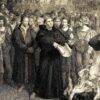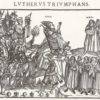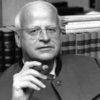Tag: Reformed
The Early Aristotelianization of Reformed and Lutheran Theology
Barth on the stillbirth of the Protestant Reformation. He underscores a reality that I have been, we have been writing about for years, in regard to the scholasticism Reformed and Lutheran. That is to note, the reception of the Aristotelian mantle that had, ironically, brought to formation the very Church, and her doctrina, that Luther was seeking to reform. Unfortunately, very early on in the second and third generation reformers (on both the Reformed and Lutheran sides) imbibed the theological categories that had originally led to the status of the Roman Church that Luther and others believed needed to be…
An Athanasian Reformed Reading of John 6:44-45: On Unconditional Election and the Effectual Call
There was a debate, very recently, between Dr. James White and Dr. Leighton Flowers with reference to John 6:44-45. The theological locus under disputation was on the Calvinist doctrines of unconditional election and the effectual call. White argued the positive position, i.e., affirming unconditional election and the effectual call; whilst Flowers argued the negative, i.e., denying unconditional election and the effectual call. For the purposes of this post, I am just going to assume the reader understands the entailments of said doctrines, and cut right to the chase in offering the Athanasian Reformed (AR) (Evangelical Calvinist) reading of John 6:44-45….
Calvin and the Conciliar Tradition against the Confessionally Reformed
The following is a post I wrote in 2012. I am simply reiterating the party-line among those who occupy the chairs within the confessionally Reformed world; i.e., that Calvin, along with the whole catholic tradition belongs to them. That they represent the most valid and definitive Protestant reception of the catholic tradition, and that Calvin simply stands among them. Thus, the great revision of Reformed development goes. Here Muller confirms what I have been asserting all the while; that he sees an organic thread between Calvin and the “orthodox, Calvinists.” He writes: In the early years of the Reformation emphasis…
How the Inscrutable unReality of Darkness Keeps Barth and the Athanasian Reformed from Incoherence and a Dogmatic Christian Universalism
I want to talk about God’s shadow side. The rip against Thomas Torrance, Karl Barth and the Athanasian Reformed is that their respective doctrine of election leads to some form of Christian universalism (some are okay with that). But in fact, it doesn’t. People like Keven Vanhoozer, Robert Letham, Roger Olson et al. have critiqued Torrance, Barth, and Evangelical Calvinists, like myself, with reference to what they take to be our theological Achilles heel. Because they think from within an Aristotelian or Stoic theory of causation in a God-world relation, they cannot imagine how the Evangelical Calvinist, after Barth, Torrance…
A Chapter for an Eclipsed PhD Dissertation: On Reformed Identity, Historical Method, and an Evangelical Calvinism as Alternative
Since this “dissertation” and PhD by Publication isn’t going to see the light of day now, I thought I would share the introduction chapter that I presented for said dissertation. Part of it includes my contribution to the introduction to our second volume Evangelical Calvinism book that I co-wrote with Myk Habets. The part I appropriate for that, in this current iteration (as introduction to my “dissertation”), is, of course, the part I wrote. And then, much of that has been augmented by further writing, as you will see. But I think it underscores some needed orientation, particularly as “Reformed…
Calvin in Barth’s Services on an ‘analogy of relation’ against Natural Theology and Her ‘Resourcers’ in scholasticism Reformed
Knowledge of God is the key, that is to the ‘secret of creation.’ If “Jesus Christ is indeed the real ground of creation,”[1] then in order to know what in fact creation is for, we must first know its Creator. But as Karl Barth underscores, in a rather Athanasian key, if Jesus is the ground of creation, and if Jesus is indeed the ‘Son of the Father,’ then to know the inner-ground, the secret of creation is first to know Jesus, to know the Son. As such, prior to knowing what and who creation is for, as the case may…
Martin Luther Against Aristotle’s Nicomachean Ethics and the Post Reformed orthodox
Martin Luther, as I have referred to previously, was indeed anti-Aristotelian, particularly with reference to Aristotle’s anthropology as that effused throughout his Nicomachean Ethics. Indeed, Luther makes his disgust toward Aristotle’s Ethics, and thus, anthropology, very clear in his theological protestations, as he nailed those, just a month prior to his 95 theses, to the Wittenberg door. This was the real reason for Luther’s reformation, as my former professor and mentor, Dr Ron Frost, has so clearly argued. Luther saw Pelagian wickedness in Aristotle’s anthropology, and of course insofar as Aquinas appropriated Aristotle’s Ethics, among other things, this compelled Luther…
The Last Word on a Reformed Doctrine of Election and Reprobation
You go online in the Reformed space, and you get the same old trope on a doctrine of election and reprobation; you essentially get the L (imited Atonement) of the TULIP served up as the ‘hard teaching’ Gospel truth reality about the way God relates to part of humanity in a God-world relation. I am here to set the record straight once and for all! This is simply not how God has related to the world, and this based on the analogy of the incarnation. We aren’t groping around in the darkness for snipes, but as Christians, instead, we have…
The Depersonalization of God’s Grace by the Thomists Reformed and others
What they aren’t telling you is that when you receive Aristotelian Christianity, when you recover Thomist theology, particularly in the Protestant Reformed scholastic flavor, for our purposes, you’re getting a doctrine of grace, and thus God, that thinks grace as a quality, a substance. Grace is depersonalized in this frame, as such the person of Christ is ruptured from the work of Christ allowing for a ‘natural’ space to obtain within a God-world relation. This is the combine of ‘grace perfecting nature’ ‘revelation perfecting reason.’ This is what the scholastic Reformed are pushing onto the “unbeknowing” masses, particularly the younger…
The Contemporary Reformed Are Recovering Catholic Modes of Thinking and Thus Spirituality: The Genuine Protestant Way Against Analogia Entis
If you’re a Catholic or scholastic Protestant thinker, you’ll follow along with Erich Przywara’s dictum (following Thomas’) of ‘revelation perfecting revelation.’ You’ll see a continuity between the naked philosopher’s machinations, and what comes in perfection through God’s Self-revelation in Jesus Christ. You’ll maintain that humanity, since it is born into an iteration of God’s grace (which is an abstract creation), has the capacity, albeit, finite, to think towards the God of creation. On the other hand, if you’re a genuinely Protestant thinker who takes the noetic effects of the fall, who takes total depravity seriously, and who does not sublate…









